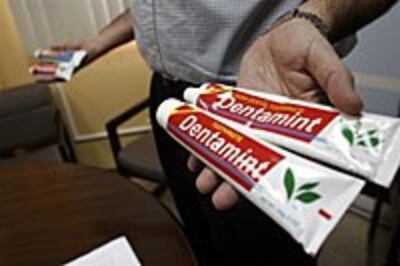
An avalanche of complaints about the safety of Chinese products may cause serious damage to U.S.-China trade, experts say.
Concern over the health risks of Chinese-made chemicals and manufactured goods has been rising since April, when U.S. officials traced contaminated pet food to adulterated wheat gluten from China.
In May, officials—first in Panama and then in Australia and the United States—found that some low-priced brands of toothpaste had used Chinese-made diethylene glycol, a toxic ingredient in automotive anti-freeze, instead of the more expensive sweetener glycerin.
In June, U.S. officials ordered a New Jersey company to recall thousands of Chinese-made radial tires for a tread-separation defect linked to accidents and deaths. Also in June, a U.S. toymaker recalled its popular Thomas & Friends toy trains made in China after they were found to be coated with toxic lead paint.
And in the same month, the U.S. Food and Drug Administration blocked imports of five types of farm-raised fish and seafood from China after finding they contained drugs and cancer-causing chemicals banned in the United States.
‘Warning label’ for consumers
It plays into the existing wariness of China and the political pressure on politicians to find some tariffs or non-tariff barriers to stop Chinese imports,
The rash of recalls has caught the attention of U.S. lawmakers, already angered over China’s huge trade surplus with the United States, which hit a record $232 billion last year. “‘Made in China’ is rapidly becoming a warning label for American consumers,” Democratic Senator Dick Durbin of Illinois said in a statement.
Meanwhile, China's Ministry of Commerce spokesman Wang Xinpei, speaking at a June 28 press conference in Beijing, said "There's no problem with Chinese exports, especially where human safety is concerned," according to a report by Bloomberg News.
“The quality of Chinese exports is assured,” Wang said.
In interviews with Radio Free Asia, experts said that China’s product-safety problems pose a serious risk both to health and to its dominance in trade.
Adam Segal, senior fellow for China studies at the Council on Foreign Relations in New York, said “if [China] can’t build an efficient and transparent regulatory system, then it’s going to have real problems convincing people in the rest of the world about its intentions and what it can deliver on.”
Segal said the safety issue has the potential to affect a broad range of U.S. imports from China. U.S. imports of Chinese seafood alone were valued at $1.9 billion last year.
“If you look at the issue of toothpaste in Latin America, there haven’t been any deaths in the United States. But if there were to be, that would seriously make the trade relationship incredibly more difficult,” Segal said.
Stories ‘out of proportion’?
China’s product-safety problems appear similar to that country’s inability to stamp out counterfeiting and violations of intellectual property rights, said Segal.
“When the Chinese are confronted with negative publicity about trade or anything else, their initial impulse seems to be to try to cover up and deny. And in this case, with some of [these] issues, they have been claiming that the U.S. is just blowing these stories out of proportion to pursue anti-China trade legislation.”
Lowell Dittmer, a China expert and political science professor at the University of California’s Berkeley campus, said that China’s product-safety problems only add to concerns about the rising volume of U.S. imports from China.
“It plays into the existing wariness of China and the political pressure on politicians to find some tariffs or non-tariff barriers to stop Chinese imports,” Dittmer said.
Dittmer said that the U.S. Congress may react with strong measures against Chinese products to protect U.S. consumers if China fails to move quickly with an effective crackdown on safety risks.
But Dittmer added that China’s vast size and a lack of effective control from Beijing will make the Chinese government’s task difficult. Thousands of products are exported from Beijing every day without close inspection, Dittmer said.
“It would require quite an act of political will. And I’m not sure … even if they tried their best … how effective they’d be able to be.”
Original reporting by Michael Lelyveld. Edited for the Web by Richard Finney.
